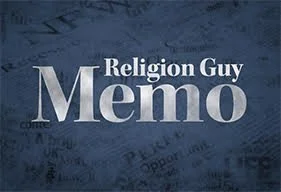If Russian invaders continue their current aggression, how much of Ukraine will be turned to rubble and how many innocent civilians will be dead by August 31?
That's opening day for the 11th global Assembly in the 74-year history of the World Council of Churches (WCC). COVID willing, the delegates from 352 Protestant and Orthodox church bodies will be joined by thousands of observers, including Catholic and evangelical Protestant representatives.
The WCC has gotten little media ink in North America during recent times, but 2022 sparks obvious news interest in how the organization deals with the Ukraine imbroglio at the Assembly, which runs through Sept. 8 in Karlsruhe, Germany.
Media that do original international reporting and have the money should be laying plans to staff the event, which The Guy knows from covering the 1975, 1983 and 1998 Assemblies supplies numerous trend stories and features alongside the spot news. Reporters unable to attend in person should be lining up contacts to help interpret the goings-on long distance.
This is a critical moment for the WCC, Orthodoxy and global Christian unity. The Russian Orthodox Church, some of whose leaders have made public statements hacking Vladimir Putin's war, is by far the WCC's biggest member — claiming 113.5 million parishioners plus another 30 million in its Ukraine jurisdiction and with ties elsewhere. That compares with the WCC's reported over-all church constituency of 580 million.
On Sunday, former Archbishop of Canterbury Rowan Williams all but demanded that the WCC expel the Russian Orthodox Church from membership:
“The riot act has to be read. When a church is actively supporting a war of aggression, failing to condemn nakedly obvious breaches in any kind of ethical conduct in wartime, then other churches have the right to raise the question and challenge it — to say, unless you can say something effective about this, something recognizably Christian, we have to look again at your membership.”
Also last week, Bishop Rob Schenck of America's Dietrich Bonhoeffer Institute in Washington, D.C., took to Religion News Service to promote a Ukraine petition campaign. It urges the WCC to expel the Russian Orthodox from membership over Moscow Patriarch Kirill's "unholy compact" with Russian dictator Putin. It states that Kirill has not condemned a "mass-murderous and wholly unwarranted war" and has even justified the invasion as having elements of “a religious crusade."
There’s more. The WCC acting General Secretary, Father Ioan Sauca (a Romanian Orthodox priest), called an emergency consultation with church leaders from eight European nations. Russians and Ukrainians were invited but unable to attend. This group denounced "the military aggression launched by the leadership of the Russian Federation against the people of the sovereign nation of Ukraine. We affirm the right of the people of Ukraine to defend themselves against this aggression."
Meanwhile some 100 Americans, including top officials from WCC member denominations, have written Kirill noting the "tragic and terrible loss of innocent civilian life" and calling on him to intervene with Russian authorities, thus joining many other Orthodox leaders with Russian ties to call for an end of the war.
Chances are the Russian team at Karlsruhe will be led by Metropolitan Hilarion, 56, chairman of the Moscow Patriarchate's Department of External Relations. He is a protégé of Patriarch Kirill, who formerly held the same ecumenical post, which involves dealings with the Vatican and the WCC. Hilarion, a prolific author of theological works and composer of music, would make for a fascinating personality profile (see this link). He spoke out against invasion plans before the invasion began.
Russian hierarchs have been loyal supporters of Putin's dictatorship, which in turn has aided the church. In an odd twist the Russians' WCC involvement previously aided the Soviet Union's atheistic rulers during the Cold War. Russians joined in WCC denunciations of western democracies and capitalism but headed off WCC complaints about Soviet harassment of Christians. The Russian priests' smuggled letter to the WCC's 1975 Assembly (.pdf here) and Alexander Solzhenitsyn's "Lenten Letter" to the Moscow patriarch, were major flashpoints. Read more about that awkward ecumenical era (click here and then here).
SOURCES:
* WCC's Geneva headquarters: www.oikoumene.org and +41 22 791 61 11. For Communications Director Marianne Ejdersten: mej@wcc-coe.org or +41 79 507 6363 or +41 22 791 6018. Communications office: +41 22 791 61 11 or media@wcc-coe.org. Sign up for WCC news releases here.
* Moscow Patriarchate official site. Email: info1@patriarchia.ru
* For a wide variety of Orthodox voices and documents that are missing from coverage in the West, see this Orthodox Christianity Twitter feed.
* WCC Vice Moderator Mary Ann Swenson is a retired United Methodist Church bishop (email).
WCC Central Committee members include:
* Diocese of the South Archbishop Alexander (alexander@dosoca.org or 214-522-4149) of the Orthodox Church in America, which was founded by Russian-Americans.
* Canon Aida Consuelo Sanchez-Navarro, Honduras-based representative of Episcopal Church Women.
* New Jersey lay woman Anne Glynn-Mackoul, representing the Orthodox Patriarchate of Antioch (contact via WCC communications).
* The Rev. Angelique Walker-Smith, from the National Baptist Convention, USA, Inc. (contact at Bread for the World, 202-639-9400) .


